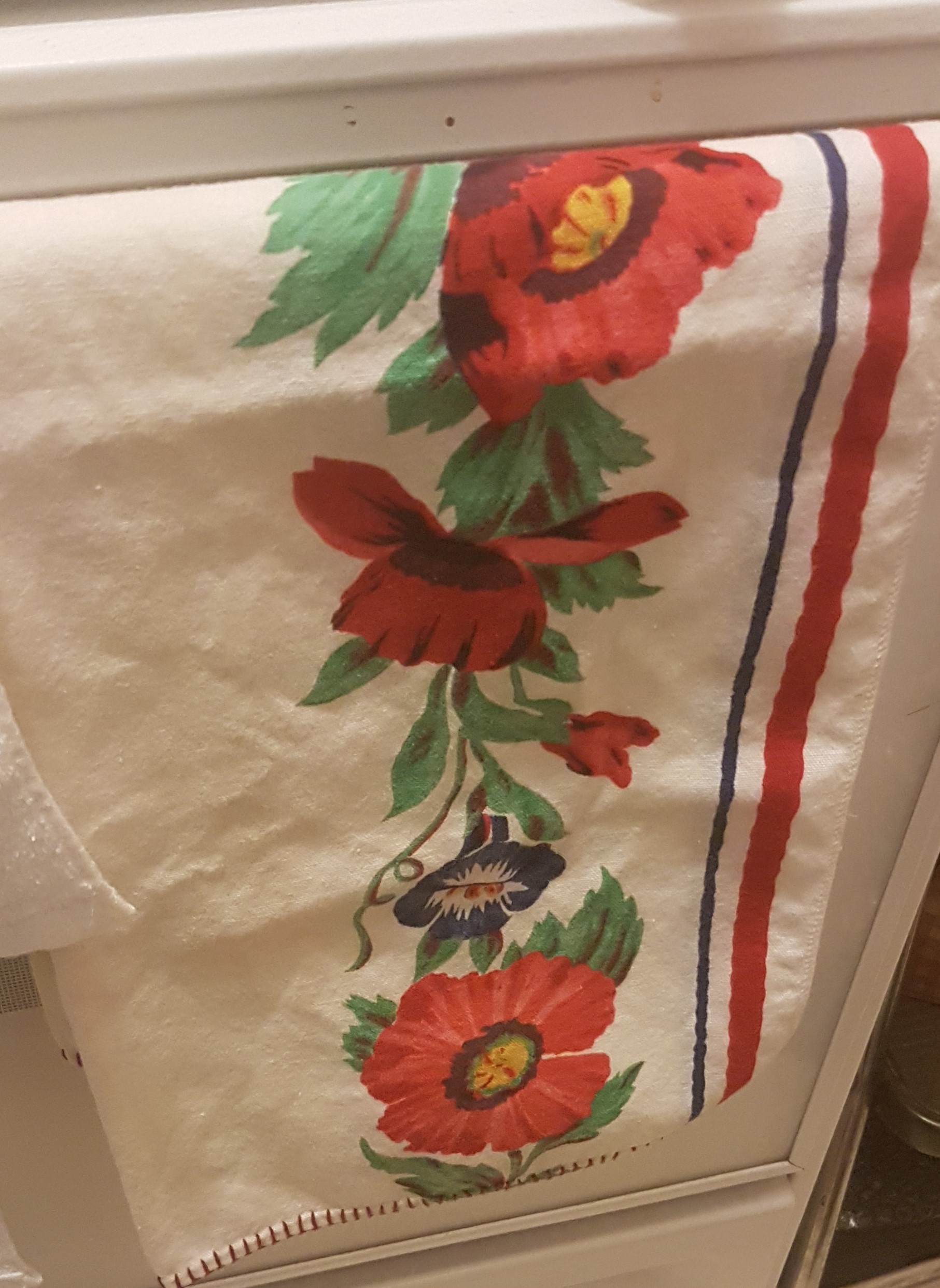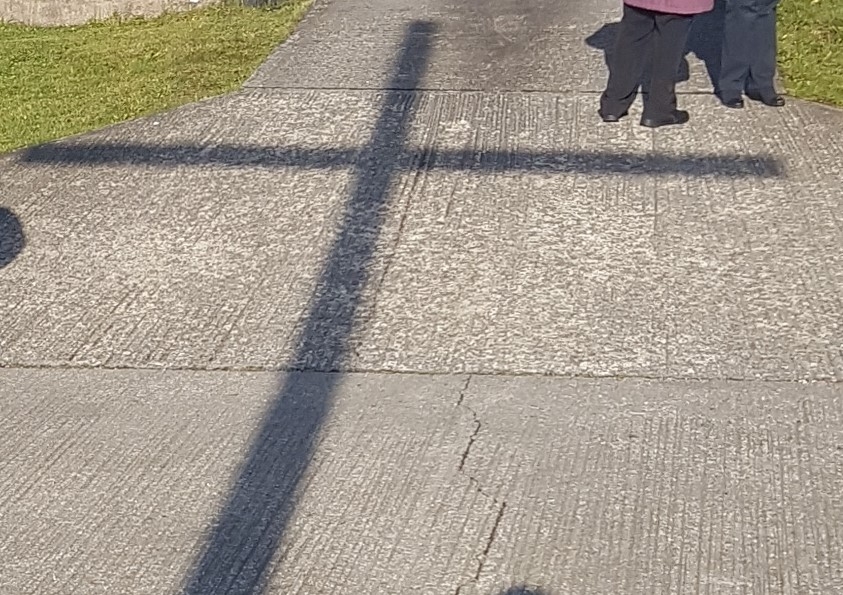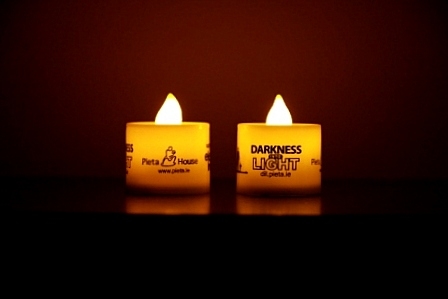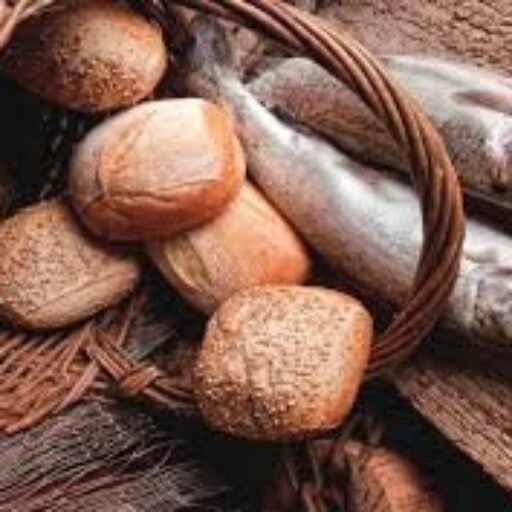
by Vincent | Nov 3, 2018 | Reflections, Religion
My aunt was washing the dishes and, I think, feared I might drop something so she left me the job of drying. Each cup and saucer, each spoon, fork or knife, was washed with a tenderness of touch that was something to behold. I knew that she knew these dishes to and from a depth, I most likely could never begin to understand.

“In my memory I will always see ….”
Turning around, I pulled the dish-towel from its neat and tidy “parking spot” on the handle of the cooker. I took a saucer from her and began to dry – she looked at me and then at the dish-towel in my hand; “Mama made that for me in 1946”, she said. I was holding a piece of material and she was living a memory. “I wanted a red and white kitchen when I was young”, she told me “and Mama made this for me”. She saw beyond where we stood and looked into, what someone called, “A room named remember” and I was happy to stand in it with her. She was standing on “holy ground” and that’s good ground to stand on.
I was reminded of this moment recently, at a diocesan gathering, when a woman spoke to us of renovating her old family home. She spoke of the many tussles she had in wondering what to let go of and what to keep. In a wonderful description, she spoke of moving various bits and pieces along the hallway, towards the skip and then pausing, leaving them in the hallway and pondering some more. It took a long time for the journey to the skip to be made, if indeed it was made at all.
There’s something being said to me in these stories about the sadness I feel – that many feel – when our church’s traditions are belittled and people hasten to the “skip” to throw there all the perceived shackles and trappings of faith. I recently heard a radio presenter saying to a guest who was discussing (in sincerity) the feelings of guilt he had around his parents and not wanting to do anything that would hurt or embarrass them – “Try being an Irish Catholic”! There followed a laugh and I so wanted to shout “Maybe you should – try being an Irish Catholic” because if you did, you’d see and understand something of the hurt and confusion felt by many who wear that badge with honour and humility, with questions and answers, in good days and in bad.
It’s difficult to see people trample on the floors of our “holy ground” with little, if any regard, for the hurt and damage they cause.
All that from a tea-towel! We need to remember, respect and re-imagine.

by Vincent | Feb 21, 2018 | Reflections, Lent 2018

Casting its shadow – Culmore Cemetery (Kilkelly)
It’s a week now since we received the cross of ashes. Its shape most likely disappeared by bedtime and most certainly washed away in the cleansing waters of Thursday morning. You’d like to think its memory has lingered a while and grounded us a little.
Today’s photo is from our November Prayers in Culmore Cemetery. As the prayers concluded, the sun came out and rose to a point in the sky where it cast a long shadow over the people as they walked and talked following our prayers. I thought of the shadow the cross casts over so many people and, unlike the one in the photo, the cross with all its weight and pain doesn’t fade quickly or pass from sight in the twinkle of an eye or shifting of the clouds.
A thought today for those so burdened. Parents grieving the loss of a child – maybe a child they never got to say hello to or one who lived and loved and left. Husbands, wives, parents, children, friends, neighbours trying to come to terms with their grief and loss. We think of those meeting doctors today who may not have a good story to hear. We remember all battling addiction and pray strength and guidance for them. We pray for healing and forgiveness for those who have been hurt by life’s experiences. We pray and, with Simon and Veronica, allow ourselves to step from or be taken from the crowd to bring healing, a soothing hand and a caring word.
The shadow cast by the cross runs long and deep but let us pray that it be a shadow that will in time – sooner rather than later – give way to hope.
Leonard Cohen put it well in his prayer for healing:
“The splinters that we carry – the cross we left behind – come healing of the body – come healing of the mind.”

by Vincent | Aug 30, 2016 | General Interest, Reflections, Religion
Like all who have heard the story from Co. Cavan concerning the death of a family in tragic circumstances, I am deeply saddned.
There is, at times like this, a call for privacy that is as necessary as it’s understandable. People, the families involved, need so much space and time now that cameras and recorders should maintain a respectful distance.
Some years ago, following the death by suicide of a man well known in a community, a mother told me that she told her son and daughter he had died, knowing that they would hear the news at school. She told me her son asked “How did he do it?” Her daughter asked “Why did he do it?” I thought the questions were telling. The “how” speaks to detail whereas the “why” brings us to a place of reflection and seeking to understand.
In this case, it is possible that neither question is appropriate to most of us. The answer is truly of no lasting benefit to us. The role we play now is not that of interviewer or observer but one of fellow traveller, needing to stop and reflect on life and to offer whatever support we can be to those who need and deserve answers more than we do.
It is with prayer, empathy and sympathy we envelop those involved.
A prayer then rather than a question – Peace for those who have died and peace for those left with crosses and questions. Amen!

by Vincent | Sep 5, 2015 | Reflections
Sometime ago, I asked for suggestions around what might be helpful on this blog. The other day I got one such suggestion. It was short and to the point, asking that I might write something on grief ….
The day I received that message was the day after I came home from holidays. While I was away, I received word that a young man from the parish had died in Adelaide. He was 28 years old, a hard worker and died doing what he liked to do, as someone put it at his Funeral Mass; “earning a day’s wage for a day’s work”. May he rest in peace.
For nearly two weeks I’d known that I was coming home the day before his Funeral Mass so, for much longer than usual, I had the chance to prepare a few words. That said, no words came to me, much as I tried to find them. I called to his home the evening I arrived and noticed the field beside his family home filled with cars and many young men from the parish, together with some of our older parishioners directing traffic, helping to park cars and being, what they needed to be, “supportive”. Saddened though I was, there was something in this display of solidarity that was wrapped in reassurance. People are not left alone when help is needed. It struck me that many of these young men were grieving the loss of their former team-mate on Kilmovee Shamrocks, mourning the loss of one who emigrated about five years ago but kept in touch with friends and family. Their grief expressed itself in “high-vis” jackets, in standing at the end of the road and directing those who wished to visit the home, say a prayer and offer condolences. Their grief may or may not have included tears but their grief was real. Thankfully it found a way to express itself – in “hands-on” help at a difficult moment.
Likewise the neighbour, whose field was being used, filling in soft spots with chippings so that cars could enter and leave the field without getting stranded. His opening the gap in a much cherished field was his way of grieving the “neighbour’s son” who was a daily visitor to his own family home during his childhood years. This man’s sister told me afterwards that it was “the hardest week of our lives”. She too knew grief as she remembered the boy, now a man sleeping in death’s arms, and the joy he brought to their kitchen with his childish stories and impish ways. The elderly neighbour down the road who seldom leaves his house had made the journey to pay his respects “Did you know him well?” I asked “There was scarcely a day he wasn’t here when he was a boy. He was a mighty worker”. Grief that took a man who seldom travels to see again the neighbours and tell them he was sorry for their loss. “I didn’t think I’d be able for the Funeral he told me”. Maybe he meant able to be in the church with so many people for so long but maybe too, he just wasn’t able to take in the fact a twenty-eight year old had died. Grief takes many forms and expresses itself in a myriad of ways.
I took my place in the home. I looked at the coffin and the young man within. I looked at his parents, brothers and sisters and wondered what I could ever say that could even go close to being a comfort. They weren’t sobbing or bent over in visible heartbreak but they were devastated. Happy perhaps, to have him home for the few hours. It had been a long wait and a long journey but there was a hard reality in that room. One of the children had died. Grief was present. Grief is real.
I searched for something there – something I could use as a landmark, a pointer that might in time, lead to a better place and a happier moment. Nothing came to me, much and all as I wanted it to. I looked at photos, football jersey and faces but none of them uttered a word. Grief sometimes doesn’t allow much to be said and, even if it is said, seems to dull the hearing. “I’m truly sorry” I told them in turn or “sorry for your trouble” or “I wish you hadn’t to be here ….” I tried to vary my words a little but the core truth was the same, it was a difficult and heart breaking moment for this family.
Without finding a landmark, I left the house and walked back to my car, past lines of people waiting to do what I had just done. Lines of silent people. Yes, they were talking but nothing much was being said. Grief envelops a crowd and brings the crowd to a stilled silence. I’m sure there were hundreds there but very little was being said. Grief does that, it stills the crowd in us and quietens the voice in us. I thanked the lads in the field and noticed how attentive they were to their tasks. There were no mobiles or walkie-talkies but they were all in communication with each other, even in the large field that, I’m told, parked over the hours around a thousand cars. Grief brought a singleness of purpose to those young people. They wanted to do the right thing by their friend and his family. Maybe grief has its good points too. It brings out, on occasion, the best in us.
Later that evening I returned to the home for a little while. I sat at the kitchen table and remembered sitting there a few weeks ago when there had been a baptism in the family. I thought how different the atmosphere had been, how much more joyful the conversation but it struck me we were at the same table – sharing food. That much was the same. I’d found my landmark. The table! Something solid around which people gather and from which they’re fed. Altar and Eucharist.
Maybe that’s what we search for in grief. That “landmark” that reminds us of what remains the same rather than what has changed. It may well be the love we had for a person, the need we felt for them the intention we had to be good to and for him or her. It might be a shared memory, a story, a journey – togetherness that remains as was, in spite of all that has happened. Grief has the ability to devastate us, to curl us up in a ball of uncertainty but I think too, it can take us to a place of recognition of the ultimate truth, what this person was in my life, all that he or she meant to me, remains constant.
I mentioned grief at the Funeral Mass. I said that I felt certain the family, member by member, the friends too, would be visited by grief. It might be a month or six; a year or more but someday tears will roll down the cheek and the stomach will tighten as if recoiling from a blow. The timing of its visit is not in our hands. Neither the duration of its stay. Grief sets out its own agenda and makes its own travel plans. Someone once said that they only way to ensure you never cry at a funeral is to never love anyone. The price we pay for love is grief. Grief at moving away, at separation and, of course, at death. There’s little, indeed nothing, that can be done to avoid it but maybe there’s a way to live with and through it.
A friend once told me that before a football game. the team manager was giving the warm up talk in the changing room. I’ve no doubt it was impassioned and colourful but the piece of advice my friend remembers, long after he hung up his boots for the final time, was around coping when the game wasn’t going your way. The manager told them if they found themselves going through a dry spell, when nothing seemed to work for them, that they shouldn’t try to be fancy. “Don’t try to solo the length of the pitch”, he told them, “you’ll not make it”. “Neither”, he said “try an elaborate pass” His advice was rooted in the simple. “Take a short pass from a team mate, move the ball to another, do something simple with the ball”. It makes such sense. It’s about getting confidence back, finding direction and knowing what you’re about. The manager concluded, according to my friend’s telling with these words; “If the game is going bad for you, do something simple with the ball. Play yourself back into the game”.
“Play yourself back into the game”. Grief? Connection? I think it’s something about finding something that gives you strength and confidence on the darkest days. It’s about knowing you are not on the pitch alone, that there are team mates there who will pass support to you and receive it from you. It’s about “doing something simple” to find peace for the moment and direction for the moments to follow. It’s about playing yourself back into the game because the bad patches pass and what’s important, the landmarks remain. Maybe it’s about reading a piece through which you’ve been consoled or spending some time with old photographs, it might be listening to a song, going for a walk or anything that connects you with the source of your grief, the one you miss. It’s not about doing anything dramatic. Just “something simple” … with the ball, with grief.
Is this enough about grief? Quite doubtful, I honestly don’t know but maybe it’s a start.





